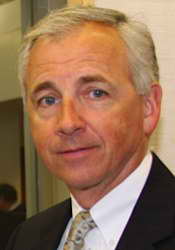By John Sparks
The swine flu outbreak began last spring when the first cases were reported at St. Francis Preparatory School in Queens, New York. In an interview with the Marist Poll’s John Sparks, Assistant Principal Patrick McLaughlin recalls last April’s outbreak and addresses steps the school is taking this Fall to meet the threat of the swine flu epidemic. Read the full interview below.
John Sparks
One of the first incidents of Swine Flu, or what is now known as H1N1, began at St. Francis. Were you surprised of the outbreak taking place at St. Francis?
Pat McLaughlin
We were very surprised. In fact when we started having some cases come in, we didn’t know what it was, and that was about April 23rd or so of this year. And, it took us a day to find out from the Department of Health that it may have been the Swine Flu going through the building. So, yeah, we weren’t ready for something like that.
John Sparks
Have you ever been able to determine why it took place at St. Francis?
Pat McLaughlin
We had some senior students who went on a trip to Cancun, Mexico, and it was not school sponsored. They went on their own. We know that a couple of those students were ill when they came back from the trip and then came to school while they were ill. So, as we look back, when they entered the school, I guess it was the 19th or 20th of April, quickly the organism, the pathogen started spreading from one student to another. And, as you know, being in a classroom with bodies in close contact, it’s very easy for a pathogen to spread very quickly. So, we think that’s how it started here.
John Sparks
As we approach the flu season, we’re also approaching the beginning of school for the Fall semester. What preparations are you taking to meet the threat of the Swine Flu epidemic?
Pat McLaughlin
Just to say that we’ve been through this once, and that was a great education for us. We did close for a week. We removed people from the building – staff, faculty, and students. We scrubbed the building down. Now, we think coming into September to a new school year, it’s a lot about education, and first and foremost, we’re going to meet with faculty and staff and students, and one of the first things we’re going to say is if you feel sick, don’t come to school. If you have symptoms of a flu, don’t come into the building. We’re going to say that at the assemblies. We’re going to put it on the website. We are going to have it scrolling on monitors that we have set up in the public areas of the building, the lobbies. We’ll have it in much of our paperwork that goes home to parents as well. So, we have to make a stand in terms of educating everyone within the community as to what the symptoms are of any type of flu and what precautions to take. So, that’s going to be one of the jobs we have at hand for the beginning of school.
Our nurse has been traveling throughout the summer to a variety of workshops to give her expertise to other educational administrators as to what she went through, and she also has come up with a plan for the medical office in terms of dealing with those students coming down with any type of illness. And, if they show signs of fever and flu-like symptoms, they’ll be immediately quarantined into a part of our auditorium, and it’s been advised that they wear protective masks as well so they don’t transmit the disease to someone else. So, I think coming into this school year, we’re ready in terms of getting the information out, in terms of educating the people within the community, and ready to just get into action with anything that we’re confronted with.
John Sparks
We conducted a national poll, and we asked the American public how concerned they were about Swine Flu, and about 36% of the American public said that they were very concerned or somewhat concerned, but 64% said that they were not very concerned or not concerned at all. I’m just curious to your reaction to that and whether you anticipate another outbreak of Swine Flu?
Pat McLaughlin
Well, you can me put in the category that says very concerned at this point, because we’re dealing with a population that is a target population for the disease. We’re dealing with a population that is always in close contact, and from our experience in the Spring, we saw how quickly the incubation period for the Swine Flu is. So, it concerns us greatly that we have everyone onboard in terms of the information that we’ll give them, everyone onboard understanding what to do if they feel ill or if they see other people who are ill. So, that’s a great concern for us. And, I would dare there say that any school should be very concerned about the precautions that they need to take. They should be very concerned about knowledge within the building of illness. So, I think that’s something any school has to take seriously coming into the new school year.
John Sparks
Now, I spoke with some people in the health services community who told me that even if they put all efforts and resources toward manufacturing vaccine for H1N1, that there would not be nearly enough and that would also impact the reserves for what we call traditional flu vaccines. I’m just curious, have any of your students been getting vaccinated?
Pat McLaughlin
I can’t speak to that right now, because they have not been in the school yet. Our new incoming freshman class will be in the building starting on Monday and Tuesday. So, that’s the first that we’ll see of them. But we don’t have a measurement on how many students or faculty have gotten the flu shot yet.
John Sparks
You mentioned about your school nurse and some of the things that have been going on. I’m just curious what role the city or state health departments may have been playing in all this since the outbreak last Spring.
Pat McLaughlin
They were a tremendous help to us. We immediately contacted the Board of Health. Again, when it first hit us that, I guess it was the Thursday the 23rd, and we had a number of students come down to the medical office ill, we didn’t know what it was. We didn’t know whether it was a flu, whether there was something in the air or what it was. So, we immediately contacted the Department of Health when we saw the numbers that we were facing. They sent a person in the next day who did some swabs and identified that it was indeed the Swine Flu. So, we followed their direction from that very beginning of the episode, and they’ve been extremely helpful. They were in contact with us through the entire spring semester, the rest of the entire spring semester, guiding us, helping us, giving us feedback, and we have been awaiting their recommendations on what school should do for the upcoming school year. So, we’re going to implement those as well. But, I have to say that the Department of Health in consultation with the Centers for Disease Control and the mayor’s office were a great help to us in getting through this whole episode.
John Sparks
Since that episode last spring, has it had an impact on your enrollment for the fall?
Pat McLaughlin
I don’t get that impression. In freshmen that we talk to and parents of freshmen who are incoming, that didn’t seem to play a role. I think people looked at it as we just got a little bit unlucky here in the spring, and it doesn’t seem to have played a role in the school itself, because I think people know the quality of the education here. They know that the — when they come here, they’re going to get a caring, nurturing environment. So, I don’t think that episode really played a role in enrollment.
John Sparks
I’m just curious, Pat, how you might characterize the feelings of the parents, the students, and the faculty – fearful, cautious, anxious, unconcerned?
Pat McLaughlin
Learned. I think we went through a situation together, and I have to say that when the Department of Health followed up with a survey about what we did here and who got sick and what they did with medical care, we had a tremendous outpouring of parental support, and I think the people within the school also stepped up to keep everything going in terms of the academic work for the students. So, it was… that was, I guess, the most positive thing that could’ve come out of a negative situation was that the community came together and realized that we just got a little bit unlucky, and we have to do the best with it as we could at that point.
John Sparks
I’m just curious in looking back, and hindsight is 20/20, what you might’ve learned from the incident last spring? Was there anything that you would do differently? And, as a result of what happened, I would think that, perhaps, Saint Francis certainly is doing everything possible to deal with this in the future.
Pat McLaughlin
I think if we knew then what we know now, we would’ve implemented the things that we’re going to implement this September. If we knew the Swine Flu was coming our way, there would’ve been a great effort on our part to educate people about the aspects of influenza, of the Swine Flu, and how to prevent it, also what to do if you feel ill. If you have a fever and you feel sick, stay home. And, we had some students who felt sick, had a fever and still came to school and still tried to push it, and that’s commendable that they want to be in school, and they want to learn; but at the same time, it perpetuated the illness within the community and made it worse. So, we learned that about the influenza at that time. We also learned that if we do have a number of students come down with these symptoms, to quarantine them. Our nurse’s office wasn’t big enough to take care of a quarantine at that time. So, now we’ve… in our emergency plan, we have sectioned off a part of our auditorium where we can put those students and isolate them until we can make contact with their parents and have them come up and pick up their child to get medical care. So, I think we learned a lot from that experience, and what we learned, we are now implementing at this point.
John Sparks
Pat, I sure appreciate your time this afternoon. Anything else that you would like to add or speak to in regard to H1N1?
Pat McLaughlin
Well, I just want to say, John, that we do a cleaning during the summer anyway. The building’s spotless when the students come back, and we did the same thing. And, when this first hit on the 23rd, that weekend we spent the money, we brought a crew of our maintenance people in, and they scrubbed down the entire building. So, I’d like to say that we’re ready to go with the school year; we’re prepared, and I’m hoping that the information that we have will help us deal with anything that comes in.
** The views and opinions expressed in this and other interviews found on this site are expressly those of the speakers or authors and do not necessarily reflect the views of The Marist Poll.
Related Stories:



